ELECTRIC FIX
ELECTRIC FIX
We review some of the latest cutting edge electric machines hitting the market
The past few years have seen a massive increase in the number of electric or battery powered excavators hitting the market.
Whilst they are called electric machines, they all run on pre-installed battery packs allowing them to be recharged from a suitable power point with most claiming an 8-hour run time on a full charge.
Unlike diesel variants where a machine can be left idling whilst it is not in use, battery powered machines cannot. Once the levers are still, the machine stops, starting instantly when you move the levers again. This method of operation reduces the actual running time of a machine meaning the battery life lasts longer as it only drains the power when the machine is physically in motion.
In this feature we aim to bring you a brief overview of what is available in the excavator market for battery powered machines. We will exclude the huge mining machines and material handlers running from fixed electrical supplies and concentrate on rechargeable machines instead.
Whilst world-leading manufacturer Caterpillar showed off prototypes of their 301.9 mini and 320 medium excavators at Bauma 2022, it is their Norwegian dealer Pon Equipment who have been at the forefront of supplying their own, bespoke CAT machines into their home market. With the Norwegian government calling for emission free city centres, Pon decided to develop and build their own battery versions of the popular 310 and 320 models. Called the Z-Line, both excavators have been stripped of their internal combustion engines and reconfigured with powerful electric motors and battery packs of 50kWh and 120kWh respectively.
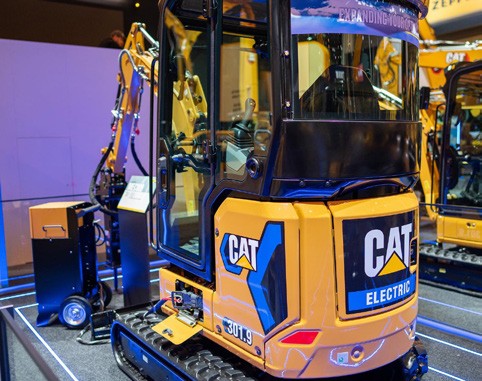

Case has launched the CX15EV and the CX25EV compact excavators into their line-up. Both feature a lithium-ion battery, charged either by the 110V/220V on-board charger, or via an external rapid charger that can have the machine charged extremely fast, typically within 90 minutes, depending on the charger type. Case claim both machines have ample battery power to allow them to work a full eight-hour day depending on the application. Case is also focusing on connectivity with these new electrified mini excavators, making SiteWatch telematics standard on each machine for optimal visibility into machine performance, and greater collaborative fleet management with the local Case dealer.

Bobcat has followed their initial launch of their E10e 1 tonne excavator with the introduction of their E19e mini excavator to the world back at Bauma in 2022. Fitted with a 17.3kWh battery, the 2-tonne class excavator is designed for a continuous 3.5 hour working cycle. Like the Develon, the E19e uses automotive battery and charging technology to provide quick charging times allowing the excavator to regain 80% battery capacity in a similar number of minutes.
Develon, like many in this sector, have chosen to start their electric journey in the 2-tonne sector. The DX20ZE-7 mini-excavator is powered by an in-house-developed 20.4 kWh lithium-ion battery pack. The mini excavator has been developed with a quick-charger system capable of recharging the battery back to 80% charge in just 80 minutes of charging. The battery’s full capacity can be achieved following an overnight charge. “The DX20ZE-7 is designed to meet a growing demand for electric machines,” says Stephane Dieu, Excavators Product Manager for Europe at Develon. “As compact equipment, such as mini excavators, has a higher tendency to work in cities and residential areas, where it has proximity to other workers, it has a great advantage over the diesel counterpart due to less noise and no emissions.” At the 2024 Intermat show Develon exclusively showed off their 14W-EREV electric concept vehicle, the most advanced, state-ofthe-art machine of its kind. This electric wheel excavator is designed with a regenerating drive system (eDrive), advanced swing system (eSwing), and eWorking systems to ensure maximum efficiency with zero emissions.
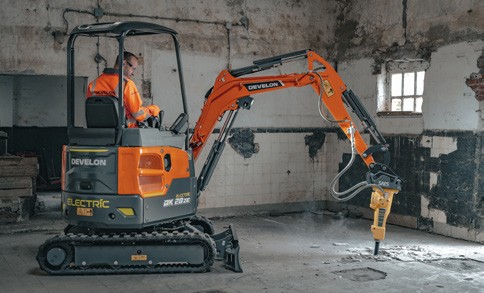

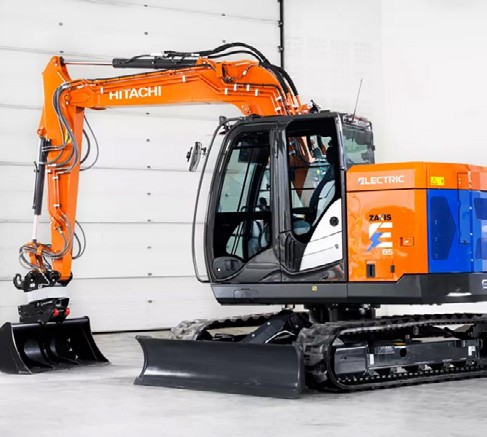
Leading Japanese excavator manufacturer Hitachi’s first foray into the battery powered excavator world was with their ZE85, an 8-tonne class, 40kWh machine. Their range has been continually added to with the introduction of a ZX55U-6EB compact tail swing excavator with a 39.4kWh battery. The battery allows for a continuous run time of 2 hours and whilst this is relatively lower than its competitors, the ZX55U-6EB can also be plugged into a suitable power supply allowing it to work entirely from the grid. The 5.5 tonne machine has recently been joined by a similar 8.5 tonne variant, the ZX85-6EB with the ability to operate as a battery or plugged in machine. Two further machines are currently undergoing field testing with 2 tonne and 13 tonne class machines providing customer feedback around the globe. The initial ZE85 model was also joined by a Powertree containerised battery system capable of recharging EV’s where suitable grid conditions are not present.

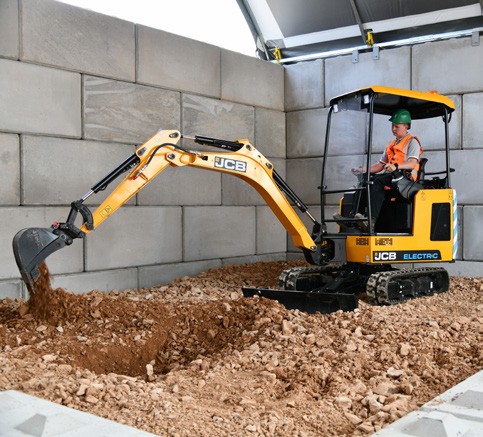
British manufacturing giant JCB was the first company to publicly announce a battery powered excavator in 2019. Their 19C-1E with a weight of nearly two tonnes brought a mass produced, zero emissions excavator to the market for the first time. As is always the case, sceptics decried it would be a failure because of the lack of infrastructure in place for recharging, but this has been far from the truth as its popularity has grown massively serving a growing market for working indoors and in sensitive areas. Such was the popularity of the concept, virtually every other mainstream manufacturer is following the need to supply low noise, emissions free machinery. Since the 19C-1E’s launch, JCB has gone on to produce a wider range of battery powered construction equipment.

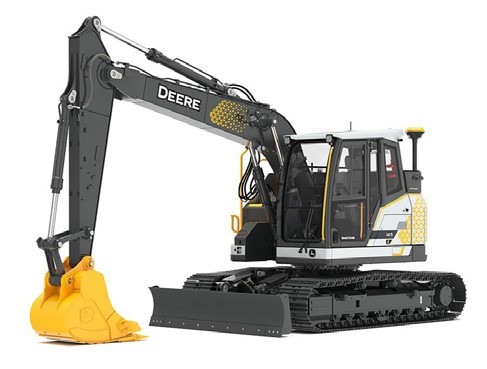
American manufacturer John Deere showed their first electric excavator concept, a 145 X-Tier, at CES 2023. They have also taken a stake in battery manufacturer Kreisel to ensure perfect compatibility with their equipment. Deere acquired a majority stake in Kreisel Electric, which created state-of-the-art battery technology for a wide range of mobile and stationary applications. Kreisel's patented immersion cooling architecture provides unsurpassed lifetime, enhanced safety, and improved performance for battery-powered equipment.
Japanese manufacturer Kobelco was one of the first entrants into the electric market with their 17SR debuted at Bauma 2019. Intermat 2024 saw the company launch their next model, the SK58.
Sany launched their SY19E mini excavator onto the market in 2023. The 2-tonne class excavator is equipped with a 15kWh lithium iron phosphate (cobalt free) battery which allows for faster, safer and more efficient charging as well as a significantly longer battery life to reduce total cost of ownership. Featuring a single automotive standard charging socket, the machine offers a fully flexible charging solution that includes a fast charge option of 1.5 hours, without the need to purchase any additional equipment.
Liugong is another brand to have brought electric power to their mini excavator range. The 9027FE comes with a 2.7 tonne operating weight and a 20.6kWh battery pack. Leading the push for larger battery powered excavators, Liugong has also introduced the 922FE. Based around their latest F series 22 tonne excavator, the electric version carries a compact pack capable of storing 423kWh in its cobalt free lithium-ion battery.
French manufacturer Mecalac have a reputation for designing excavators away from the norm. Their 12MTX is a wheeled excavator fitting that category and one which the company believes is the ideal candidate for electrification. The electric version of the 12MTX fits perfectly within Mecalac’s philosophy of moving towards urban building sites that are ever-more compact, high-performance and environmentally friendly.
The Sunward SWE 20FED is the first electric mini excavator from the Chinese brand. Based on their bestseller in the European market, the SWE 20F, the SWE 20FED combines durability, reliability, performance, and easy maintenance with in house technology developed by the manufacturer. Like many others, this 2-tonne class excavator is available in cab or canopy specification and, according to the dealers, will make a mark on the new market of electric excavators with its exceptional value for money. Power to the SWE 20F comes from a Lithium-ion battery pack with 13.4kWh output.
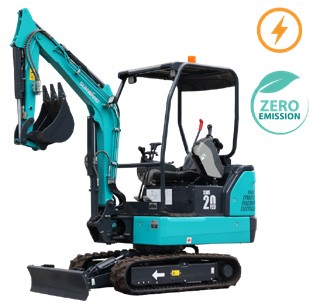

Yanmar’s first zero-emissions mini excavator – the SV17e is powered by all-electric drive and features an opencentre hydraulic system with load-sensing hydraulic pump. The SV17e delivers 23.5 kWh and is fitted with a bespoke LCD operator interface and 400V optional fast-charging capability (230V standard). In normal working mode, a full charge provides 4.5 hours of digging time, or a four-hour mixed duty cycle (20% travelling, 80% digging). Aimed at customers in the European market looking for a sub two-tonne electric solution, the SV17e is perfectly suited to a diverse range of construction, civil engineering, agriculture and landscaping applications.
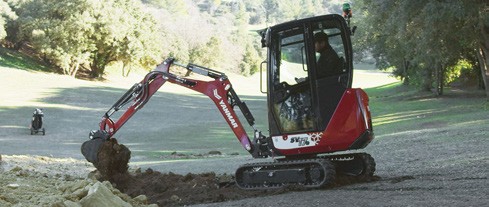

Volvo were quick to throw their weight behind a whole range of battery powered compact machines including their EC18, ECR18 and ECR25 compact excavators. Both the EC18 and ECR25 excavators use identical 20kWh battery packs replacing the traditional diesel engines with the smaller ECR18 using a lower capacity 16kWh version. The EC18 provides a standard upper structure whilst the ECR18 and ECR25 use the reduced tail swing body and reducing the machine’s overall size. Volvo are also one of the first manufacturers to offer an all-electric machine further up the weight scale with the recently launched EC230 Electric. Outwardly, the 23-28 tonne excavator looks the same as its fossil fuelled brothers. Under the skin lies the difference with a combination of battery packs delivering 264kWh of power. The technology packed into the excavator isn’t new with many thousands of hours of successful service already achieved from the company’s range of on-highway trucks.
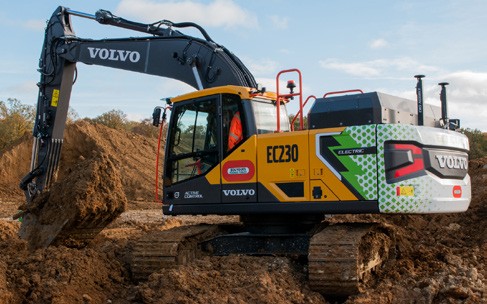

The new 100% battery powered TB20e is Takeuchi’s first electric machine and has benefited from extensive field testing with United Rentals in the USA. Designed to deliver a full 8 hours of working time at a 65% load, the 2 tonne class mini is powered by a 24.7kW lithium-ion battery and comes with 3 charging options: onboard, offboard and tethered. There is also a portable fast charger option available for the TB20e that securely rests on the blade when transporting.
XCMG showed off their prototype XE19UE on show at Intermat which will be quickly followed by a larger XE27UE mini and XE215E full size machine.